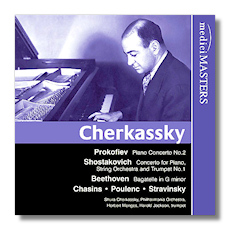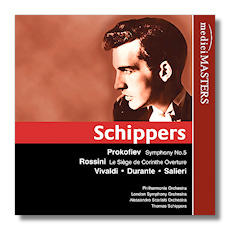
The Internet's Premier Classical Music Source
Related Links
-
Beethoven Reviews
Poulenc Reviews
Prokofieff Reviews
Rossini Reviews
Shostakovich Reviews
Stravinsky Reviews
Vivaldi Reviews - Latest Reviews
- More Reviews
-
By Composer
-
Collections
DVD & Blu-ray
Books
Concert Reviews
Articles/Interviews
Software
Audio
Search Amazon
Recommended Links
Site News
 CD Review
CD Review
Medici Masters

Shura Cherkassky Plays
- Serge Prokofieff: Piano Concerto #2 1
- Dmitri Shostakovich: Piano Concerto #1 1
- Abram Chasins: Three Chinese Pieces
- Francis Poulenc: Toccata
- Igor Stravinsky: Circus Polka
- Ludwig van Beethoven: Bagatelle in G minor, Op. 119 #1
Shura Cherkassky, piano
1 Philharmonia Orchestra/Herbert Menges
Medici Masters 013-2 ADD mono 70:04


Thomas Schippers Conducts
- Serge Prokofieff: Symphony #5 1
- Gioachino Rossini: L'assedio di Corinto: Overture 2
- Antonio Vivaldi: Sinfonia "al Santo Sepolcro" in B minor, R.169 3
- Francesco Durante: Concerto #5 in A for String Orchestra 3
- Antonio Salieri: Axur, re d'Ormus: Overture 3
1 Philharmonia Orchestra/Thomas Schippers
2 London Symphony Orchestra/Thomas Schippers
3 Orchestra Alessandro Scarlatti/Thomas Schippers
Medici Masters 012-2 ADD 3monaural 72:54
Medici Masters is a new label put out by Medici Arts Limited, the same people responsible for BBC Legends, the Royal Opera House Heritage Series, and Classic Archive. There are 20 releases so far. Some of them are taken from concert or broadcast material, and some are reissues from the studio archives of EMI Classics. Both of the CDs reviewed here contain studio recordings, originally released on Angel or EMI.
Shura Cherkassky died in 1995, and was commonly regarded as one of the last Romantic pianists in the mold of Vladimir Horowitz and Jorge Bolet. Cherkassky recorded less frequently than those pianists, however, and for more labels, so his discography has been more difficult to organize. These recordings, which date from between 1954 and 1956, were made when the pianist was in his middle to late 40s, and really at his peak. (His late recordings do his reputation no disservice, though.) Cherkassky programmed what was then "modern" music more commonly than many of his contemporaries, and he seems to have had a real affinity for it. In other words, the works on this CD are not uncharacteristic of him.
Although Cherkassky doesn't avoid the razzle-dazzle of the Prokofieff, the thing that one remembers about this recording is how lyrical the pianism is, and how golden Cherkassky's tone seems to be. He and Menges make the concerto less cruel and sardonic than it sometimes is, and it works this way, even though I found the opening of the final Allegro tempestoso to be a little tame. Of all the recordings of this work that I know, this one is the most genial, so it should wear well. Menges keeps out of the way. Much the same can be said of the Shostakovich concerto, the one for string orchestra and trumpet, here played by the Philharmonia's Harold Jackson. Cherkassky and Menges find the fun and the complementary mock-seriousness in the work, without allowing it to descend into a manic state. It reminds me of Shostakovich's youth, when he played the piano in silent movie theatres, and sometimes disrupted the films with his laughter.
"Rush Hour in Hong Kong" from Chasins' Three Chinese Pieces was a common encore on Cherkassky's programs. Here, we can hear him playing the other two works: "Flirtation in a Chinese Garden"(!), and the gorgeous "Shanghai Tragedy." Cherkassky leaves us wondering why more pianists don't take these works up. The encores by Poulenc, Stravinsky, and Beethoven are given with flair and humor; Cherkassky particularly seem to enjoy the pachydermal delights of the Circus Polka.
The monaural recordings lack brightness and depth, particularly in the Prokofieff, but they are tolerable. There are good booklet notes by Chris de Souza, who relates each of the works to Cherkassky's particular skills. In the past, I've been more respectful than enthusiastic about Cherkassky's pianism, but this CD won me over.
American conductor Thomas Schippers died in 1977, before even reaching his 48th birthday. Great things were expected of him, and he accomplished many of them in a short time, but this CD makes one melancholy that a conductor's usual longevity was denied him. After graduating from high school at 14, he studied at Curtis and Juilliard, and when he was 19, he was Eileen Farrell's piano accompanist on a tour of South America – what an education!
The Vivaldi, Durante, and Salieri recordings were made in 1955, when Schippers was a hoary 25 year old. I wonder what the Naples-based orchestra thought of this handsome young American whose elegant and cantabile conducting could not have been more Italianate? The famous Adagio molto movement of the Vivaldi is heartbreakingly intense, and the adorable Durante concerto and Salieri overture (very Mozartean!) could launch new revivals for these composers. The monaural recording is not bad.
One of the most frustrating gaps in the CD catalogue is the EMI recording of Rossini's L'assedio di Corinto, with Schippers conducting, and Beverly Sills and Shirley Verrett in the lead roles. The La Scala revival in 1968 with Schippers and Sills was a sensation, and the EMI recording in 1974 (following performances at the Met) was quite an event at the time. Schippers was a Rossini specialist, for the same reasons that he was so apt in the works discussed above. It's great to have the exciting overture on CD, even if it is reverberantly recorded; now, may we have the rest of the EMI recording?
Schippers also had a way with Prokofieff. His Columbia Alexander Nevsky with the New York Philharmonic and Lili Chookasian is one of the very best, and this 1957 recording of the Fifth Symphony also is a benchmark. I think this is its first reissue on CD. Schippers is pretty straightforward, but strong on contrasts. There's no pushing and tugging at the score to create surface effects. He is imposing without being heavy, and again, there's a strong lyrical core running through the work. Among Western conductors, his interpretation is the most Russian… or should I say "Soviet"? At any rate, this is a recording to live with, even if the sound is a little faded and not ideally detailed.
Both of these releases demonstrate how many treasures from the LP era have yet to be reissued on CD. Medici Arts has done an excellent job restoring them and bringing them to a new public.
Copyright © 2008, Raymond Tuttle




















